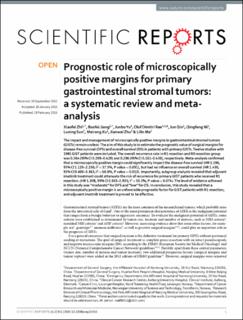Prognostic role of microscopically positive margins for primary gastrointestinal stromal tumors: a systematic review and meta-analysis
Zhi, Xiaofei; Jiang, Baofei; Yu, Junbo; Røe, Oluf Dimitri; Qin, Jun; Ni, Qingfeng; Sun, Luning; Xu, Meirong; Zhu, Jianwei; Ma, Lilin
Peer reviewed, Journal article
Published version

Åpne
Permanent lenke
https://hdl.handle.net/11250/2652949Utgivelsesdato
2016Metadata
Vis full innførselSamlinger
Sammendrag
The impact and management of microscopically positive margins in gastrointestinal stromal tumors (GISTs) remain unclear. The aim of this study is to estimate the prognostic value of surgical margins for disease-free survival (DFS) and overall survival (OS) in patients with primary GISTs. Twelve studies with 1985 GIST patients were included. The overall recurrence rate in R1 resection and R0 resection group was 0.364 (95% CI 0.299–0.429) and 0.296 (95% CI 0.161–0.430), respectively. Meta-analysis confirmed that a microscopically positive margin could significantly impact the disease-free survival (HR 1.596, 95% CI 1.128–2.258; I2 = 37.5%, P value = 0.091), but had no influence on overall survival (HR 1.430, 95% CI 0.608–3.363; I2 = 60.8%, P value = 0.013). Importantly, subgroup analysis revealed that adjuvant imatinib treatment could attenuate the risk of recurrence for primary GIST patients who received R1 resection. (HR 1.308, 95% CI 0.583–2.935; I2 = 53.2%, P value = 0.074). The level of evidence achieved in this study was “moderate” for DFS and “low” for OS. In conclusion, this study revealed that a microscopically positive margin is an unfavorable prognostic factor for GIST patients with R1 resection and adjuvant imatinib treatment is proved to be effective.
